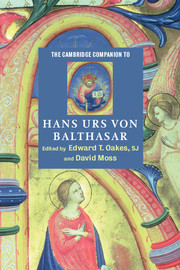11 - The theo-drama
from Part II - The trilogy
Published online by Cambridge University Press: 28 May 2006
Summary
INTRODUCTION: MOTIVATIONS AND SOURCES
If Hans Urs von Balthasar's theological aesthetics treats Christian theology under the rubric of contemplation (which entails 'seeing the form' of God's self-disclosure), then his theodramatics deals with action, both God's and ours. For Balthasar, this transition from contemplation to action in the context of his trilogy has an inherent necessity. But the 'logic' here is not the logic of formal argumentation, rather the logic of Christian existence, as perceived by Balthasar in its most basic patterns.
Motivations
As others have shown in this volume, Balthasar is aiming to write a deeply scholarly theology yet at the same time one fully in touch with lived Christian life – an aim unusual in the modern period. Whilst theology shares with other branches of learning a demand for academic discipline and the full use of the powers of the mind, Balthasar is clear that the subject matter of theology remains, first and last, the God who calls human beings into a more than merely intellectual relationship with him; the God who shapes people for his work; a personal God; the living God of the Bible and of faith.
- Type
- Chapter
- Information
- The Cambridge Companion to Hans Urs von Balthasar , pp. 143 - 157Publisher: Cambridge University PressPrint publication year: 2004
- 1
- Cited by

